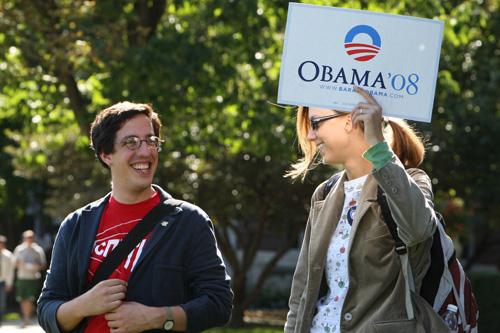Students rally against ethics rules

October 3, 2008
Following Thursday’s rally on the Quad for Democratic presidential candidate Barack Obama, teaching assistants who participated intend to self-report their violations of the state-mandated ethics policy to the University Friday morning.
Rally organizer and doctoral student Dan Colson said the purpose of the rally was predominantly an “act of civil disobedience.” The rally began at 2 p.m. Thursday in front of the English Building. About 30 people attended, and the majority identified themselves as graduate students.
State policy requires that any violations of the State Officials and Employers Ethics Act must be investigated either by the Illinois ethics office or the agency overseeing the employees in violation, in this case the University administration.
University spokesperson Tom Hardy has said that the University ethics policy is just a reiteration of the state law, which has existed since 2003.
Colson said protestors plan to report their actions and put the issue in the hands of the administration and the state. No one from the University’s ethics office was immediately available Thursday afternoon to comment on any consequences the protesters may incur.
Get The Daily Illini in your inbox!
“We want the University to know we’re aware of the policy and we want to let them know we demand our free speech,” Colson said.
Although the protest was a direct response to the memo that was sent to employees Sept. 18, Colson acknowledged that the campaign aspect was still important.
“We want people to support their free speech and the political candidate at the same time,” Colson said. “Some of us just think that the memo poses an overzealous interpretation of the law.”
The memo states that employees should not engage in political activity while they are “on University time or using University resources or property.” While it also says that the policy is not an attempt to violate individual freedoms, some participants expressed concern that a strict interpretation by the University would violate First Amendment rights.
“I wouldn’t consider advocating a political candidate in the classroom,” said Ted Underwood, professor in the English department. “But the notion that it is unethical to wear a button while on campus just seems wrong to me.”
Some protesters said the language in the memo was especially troubling for graduate students who also act as University employees.
John Claborn, graduate student, said his primary concern was the lack of a distinction between when graduates are serving as employees or students.
“According to the memo, we’re always employees,” Claborn said. “There is no line.”
Claborn added that he believed the policy, which applies to all state institutions, does not translate to a University setting.
“I’m more in support of the protest than the actual candidate,” said Zack Poppel, graduate student. “I think this action is just as important as the election, if not, more important.”






